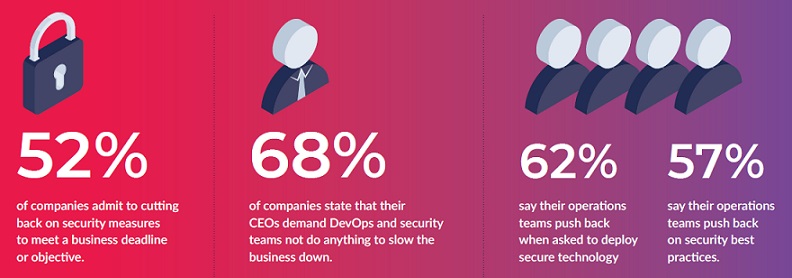Progress announced the latest release of Progress® Semaphore™, its metadata management and semantic AI platform.
More than half of companies (52%) admit to cutting back on security measures to meet a business deadline or objective, according to a SecOps research report released by Threat Stack.
As further evidence that companies are sacrificing security for speed, Threat Stack found that 68% of companies say their CEO demands that DevOps and security teams not do anything that slows the business down. But that pressure doesn’t just come from the corner office, as 62% of companies also admit that their operations team pushes back when asked to deploy security technology.

“Businesses have grappled with the ‘Speed or Security’ problem for years, but the emergence of SecOps practices really means that companies can achieve both,” said Brian M. Ahern, Threat Stack Chairman and CEO. “The survey findings show that the vast majority of companies are bought-in, but unfortunately, a major gap exists between the intent of practicing SecOps and the reality of their fast-growing businesses. It’s important that stakeholders across every enterprise prioritize the alignment of DevOps and security.”
The SecOps Reality Gap
The purpose and intent of SecOps is to build towards distributing security decisions at speed and scale to those who hold the highest level of context without sacrificing the required controls. Survey respondents demonstrated a clear understanding of the importance of SecOps to the overall success of their business, with 85% saying that SecOps is a goal for their organization.
Despite clear intent to implement SecOps, only 35% of respondents say SecOps is completely or mostly an established practice at their organizations, while only 18% say it’s not established at all. These numbers dwindle according to specific job roles: 25% of security professionals believe that SecOps is an established practice at their companies, while only 10% of DevOps professionals agreed.
DevOps and Security Teams Operating in Silos
To help understand the obstacles to implementing SecOps, Threat Stack’s research found that challenges are primarily centered on organizational alignment as DevOps and security teams are not routinely integrated.
■ 44% of developers are not trained in secure coding, and 42% of operations staff are not trained in basic security practices.
■ Only 40% of respondents agree that DevOps are always incorporated into security processes.
■ A security specialist is a part of only 27% of Ops teams and 18% of Dev teams.
■ When respondents were asked whether they have the ability to fix a security-related issue themselves, 44% of DevOps respondents said they rely on someone else vs. 35% of security respondents.
■ 41% of DevOps professionals rated their organizations’ ability to detect and remediate security incidents as “average” vs. 35% of security professionals.
The Cloud Security Consequences
The speed of today’s business is driving companies to capitalize on the business benefits of cloud infrastructure and automation in order to compete. Threat Stack’s survey showed that the lack of SecOps adoption impacts the security of this infrastructure, given that more than half of the participating professionals rated the security of their organizations’ cloud infrastructure and environment as average or worse.
Industry News
Elastic, the Search AI Company, announced the Elasticsearch Open Inference API now integrates with Anthropic, providing developers with seamless access to Anthropic’s Claude, including Claude 3.5 Sonnet, Claude 3 Haiku and Claude 3 Opus, directly from their Anthropic account.
Broadcom unveiled VMware Cloud Foundation (VCF) 9, the future of VCF that will accelerate customers’ transition from siloed IT architectures to a unified and integrated private cloud platform that lowers cost and risk.
Broadcom announced VMware Tanzu Platform 10, a cloud native application platform that accelerates software delivery, providing platform engineering teams enhanced governance and operational efficiency while reducing toil and complexity for development teams.
Red Hat announced the general availability of Red Hat OpenStack Services on OpenShift, the next major release of Red Hat OpenStack Platform.
Salesforce announced new innovations in Slack that make it easier for users to build automations, no matter their technical expertise.
GitLab announced the general availability of the GitLab Duo Enterprise add-on.
Tigera now delivers universal microsegmentation capabilities with Calico.
Tabnine announced a new platform partnership with Broadcom Inc., an integration with IBM, as well as continuing extensions of existing partnerships with Amazon Web Services (AWS), DigitalOcean, Google Cloud, and Oracle Cloud Infrastructure (OCI).
Wallarm released API Attack Surface Management (AASM), an agentless technology to help organizations identify, analyze, and secure their entire API attack surface.
LambdaTest launched KaneAI, an end-to-end software AI Test Agent.
Kubiya has closed its $12 million seed round with a $6 million extension of equity and debt financing and launched a paradigm-breaking new platform, AI Teammates, that enables true delegation of complex tasks to digital colleagues through organic, human-like conversations.
The Cloud Native Computing Foundation® (CNCF®), which builds sustainable ecosystems for cloud native software, announced the schedule for KubeCon + CloudNativeCon North America 2024, happening in Salt Lake City, Utah from November 12 – 15.
Diagrid announced the latest version of Dapr, a Cloud Native Computing Foundation incubating project maintained by Diagrid, Microsoft, Intel, Alibaba, and others, as well as an update to Conductor, a Software as a Service (SaaS) that helps manage, upgrade, and monitor Dapr on Kubernetes clusters.
Spectro Cloud announced two new formal recognitions of its strengthening position in the government technology space: the Government Software competency from AWS, and ‘Awardable’ status on the CDAO Tradewinds Solutions Marketplace for AI/ML solutions at the tactical edge.




